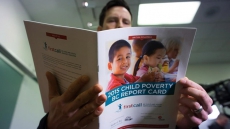TORONTO — Canada's homicide rate remained at its lowest level in five decades last year but aboriginals accounted for a disproportionate number of the victims, Statistics Canada reported on Wednesday.
Overall, police services across the country reported 516 killings in 2014 — four more than in 2013. The tiny uptick, however, had no effect on the rate, which was the same as in 2013 and the lowest level since 1966.
Among provinces, Manitoba had the highest homicide rate for the eighth straight year while Thunder Bay, Ont., picked up the dubious distinction of becoming Canada's murder capital.
Guns were more frequently used — 156 times — but the overall rate of gun killings was at its second-lowest level in 40 years.
Aboriginals accounted for almost one quarter of the victims despite comprising just five per cent of the population.
"For the first time, complete aboriginal identity data have been reported," StatCan said.
The new data show that aboriginal people were victims at a rate about six times higher than that of non-aboriginals, with First Nations men facing triple the risk faced by aboriginal females.
"Aboriginal males were seven times more likely to be homicide victims compared with non-aboriginal males," according to Statistics Canada. "The rate of homicide for aboriginal females was six times higher than for their non-aboriginal counterparts."
According to the data, the number of aboriginal female victims has remained relatively stable in recent decades, while the number of non-aboriginal female victims has declined. The result is that, proportionately, victim rates for aboriginal women have increased sharply.

Most homicides of aboriginals were solved. In fact, StatCan said, police were more likely to solve killings where aboriginals were victims than those involving non-aboriginal victims.
Overall, when the crimes were solved, most victims — 83 per cent — knew their killers, data show — a situation that has long been the case.
Acquaintances posed the biggest threat, followed by relatives. Current or ex-spouses were blamed in 83 cases or 16 per cent of all homicides, with women four times more likely than men to die at the hands of partners.
Among provinces, Manitoba had the highest homicide rate in 2014 despite seeing fewer of them, with Alberta and Saskatchewan well behind. At the other end, Newfoundland and Labrador had the fewest killings relative to population followed by Nova Scotia, which recorded its lowest rate since StatCan started collecting the relevant data in 1961.
In all, five provinces saw declines while seven jurisdictions had increases, with Alberta recording a significant jump — 22 more killings than in 2013 and British Columbia recording 12 more.
Thunder Bay, Ont., had the poorest record among major urban centres, reporting an "unusually high" number in 2014, StatCan reported. The 11 reported homicides catapulted the northern Ontario city to a rate almost three times that of second-place Winnipeg.
Regina, previously Canada's murder capital, saw its rate cut in half from a year earlier, dropping it to eighth place in 2014 among the country's 34 metropolitan areas.
Five of the larger centres — Saguenay and Sherbrooke in Quebec and Kingston, Oshawa and Brantford in Ontario — saw no homicides at all.

Statistics Canada did note that the territories historically have the highest homicide rates in Canada — with Nunavut leading the way last year.
"However, because of small numbers, there is large variability from year to year," the agency said.





